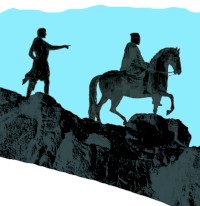Reading from Metaphysics of War, pages 95-109, originally published 7 December 1940
With Europe at war Evola seemed to sense a need to gather his previous work on the subject into a brief which he then expanded upon. The first 7 pages of this essay are essentially a review of his earlier conclusions:
1. That Western society had devolved from its sacral Аrуаn origins.
2. This features pathological engagement in action for its own sake, with sacred rites becoming frivolous past times.
3. That knowledge and contemplation that do not produce a material enrichment are now held in contempt.
4. Thus action and the sacred had been separated in the consciousness and both fallen separately into degenerate, mechanical forms.
5. War and the Path of God had been sundered and no longer converged.
6. That the Аrуаn concept of God is not earthly and chthonic but ethereal, heavenly and solar. He invokes the Olympians and the Persian Mythra ‘The Sleepless Warrior’ at the head of his Fravashi, related to the Roman lares and Norse Valkyries.
7. That the Аrуаn hero lives on not as a shadow but as a demigod. [1]
’The Dark Night of the Soul’
Evola discusses the ‘Dionysian’ rites of ecstasy in the broader context of dance, as a basic means of renouncing individuality in search of a higher union. He describes this as the basic level, related to summoning mythic Roman Furies [2] and other such creatures:
“Another life arises within the life of the individual when freed by the Dionysian rhythm, almost like the emergence of his own abysmal root.”
He cites sacred rites, such as the Hellenic agons as a higher level of ritual spirituality with war as the apogee, defining three earthly forms of elevation. He also draws on gladiatorial terminology in the Latin sense:
“The possibly of some such supra-normal experience was acknowledged to reside in the peak of danger and of heroic combat.”
In war and individual heroic pursuits the warrior’s force was thought to cause an eruption of the supernatural into the material plane and the transcendence of the mortal being from the material and into the supernatural plane. In atheistic terms this might read as Achilles or Leonidas living on in memory for thousands of years, though Evola seriously implores us to consider the ancient Roman ideal that cosmic forces strove parallel with human and that neither’s victory or defeat was inconsequential to the other.
“Thus the chieftain, acclaimed on the battlefield, provided a living experience of the presence of the mystical power which transfigured him.”
The elevation of a chieftain such as Herakles to the most adored and sacrificed to deity in mid-antiquity attested to the ancient belief that men could transcend mortality.
Evola goes on to equate the Christian practice of symbolizing sainthood and martyrdom in iconography with the halo or aureole as a preservation of the ancient Аrуаn cult of light. Also, that tension, mortal and supernatural is required to bridge the two planes is reiterated, a common thread I may have missed referencing in previous reviews of his work. In closing, the Аrуаn doctrine of action is regarded as a luminous reflection of our “higher potentialities.”
Notes
1. “which a special spiritual action has elevated from one nature to another,” as in the transformation of Gilgamesh, elevated toward the future and a union with the greater cosmos, rather than the dusty fate of Enkidu
2. Greek Erynnyes
Of Lions and Men
Gods of Boxing
link › jameslafond.blogspot.com











